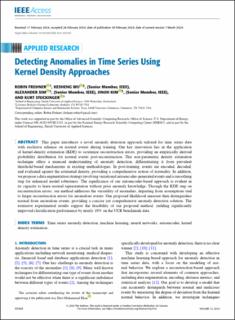Please use this identifier to cite or link to this item:
https://doi.org/10.21256/zhaw-30276| Publication type: | Article in scientific journal |
| Type of review: | Peer review (publication) |
| Title: | Detecting anomalies in time series using kernel density approaches |
| Authors: | Frehner, Robin Wu, Kesheng Sim, Alexander Kim, Jinoh Stockinger, Kurt |
| et. al: | No |
| DOI: | 10.1109/ACCESS.2024.3371891 10.21256/zhaw-30276 |
| Published in: | IEEE Access |
| Volume(Issue): | 12 |
| Page(s): | 33420 |
| Pages to: | 33439 |
| Issue Date: | Mar-2024 |
| Publisher / Ed. Institution: | IEEE |
| ISSN: | 2169-3536 |
| Language: | English |
| Subjects: | Time series anomaly detection; Machine learning; Neural network; Autoencoder; Kernel density estimation |
| Subject (DDC): | 006: Special computer methods |
| Abstract: | This paper introduces a novel anomaly detection approach tailored for time series data with exclusive reliance on normal events during training. Our key innovation lies in the application of kernel-density estimation (KDE) to scrutinize reconstruction errors, providing an empirically derived probability distribution for normal events post-reconstruction. This non-parametric density estimation technique offers a nuanced understanding of anomaly detection, differentiating it from prevalent threshold-based mechanisms in existing methodologies. In post-training, events are encoded, decoded, and evaluated against the estimated density, providing a comprehensive notion of normality. In addition, we propose a data augmentation strategy involving variational autoencoder-generated events and a smoothing step for enhanced model robustness. The significance of our autoencoder-based approach is evident in its capacity to learn normal representation without prior anomaly knowledge. Through the KDE step on reconstruction errors, our method addresses the versatility of anomalies, departing from assumptions tied to larger reconstruction errors for anomalous events. Our proposed likelihood measure then distinguishes normal from anomalous events, providing a concise yet comprehensive anomaly detection solution. The extensive experimental results support the feasibility of our proposed method, yielding significantly improved classification performance by nearly 10% on the UCR benchmark data. |
| URI: | https://digitalcollection.zhaw.ch/handle/11475/30276 |
| Fulltext version: | Published version |
| License (according to publishing contract): | CC BY 4.0: Attribution 4.0 International |
| Departement: | School of Engineering |
| Organisational Unit: | Institute of Computer Science (InIT) |
| Appears in collections: | Publikationen School of Engineering |
Files in This Item:
| File | Description | Size | Format | |
|---|---|---|---|---|
| 2024_Frehner-etal_Detecting-anomalies-in-time-series-using-kernel-density-approaches.pdf | 1.92 MB | Adobe PDF |  View/Open |
Show full item record
Frehner, R., Wu, K., Sim, A., Kim, J., & Stockinger, K. (2024). Detecting anomalies in time series using kernel density approaches. IEEE Access, 12, 33420–33439. https://doi.org/10.1109/ACCESS.2024.3371891
Frehner, R. et al. (2024) ‘Detecting anomalies in time series using kernel density approaches’, IEEE Access, 12, pp. 33420–33439. Available at: https://doi.org/10.1109/ACCESS.2024.3371891.
R. Frehner, K. Wu, A. Sim, J. Kim, and K. Stockinger, “Detecting anomalies in time series using kernel density approaches,” IEEE Access, vol. 12, pp. 33420–33439, Mar. 2024, doi: 10.1109/ACCESS.2024.3371891.
FREHNER, Robin, Kesheng WU, Alexander SIM, Jinoh KIM und Kurt STOCKINGER, 2024. Detecting anomalies in time series using kernel density approaches. IEEE Access. März 2024. Bd. 12, S. 33420–33439. DOI 10.1109/ACCESS.2024.3371891
Frehner, Robin, Kesheng Wu, Alexander Sim, Jinoh Kim, and Kurt Stockinger. 2024. “Detecting Anomalies in Time Series Using Kernel Density Approaches.” IEEE Access 12 (March): 33420–39. https://doi.org/10.1109/ACCESS.2024.3371891.
Frehner, Robin, et al. “Detecting Anomalies in Time Series Using Kernel Density Approaches.” IEEE Access, vol. 12, Mar. 2024, pp. 33420–39, https://doi.org/10.1109/ACCESS.2024.3371891.
Items in DSpace are protected by copyright, with all rights reserved, unless otherwise indicated.